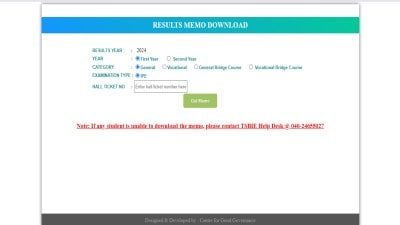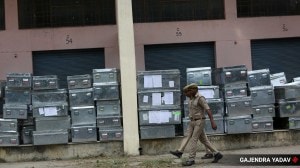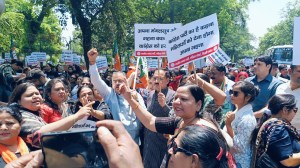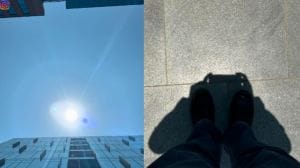- India
- International
Explained: The content and scope of Article 142, invoked by Supreme Court to release Perarivalan
This provision of the Constitution gives the country's top court wide powers to do "complete justice" in a case. Article 142, which started out as draft article 118, was adopted by the Constituent Assembly on May 27, 1949.
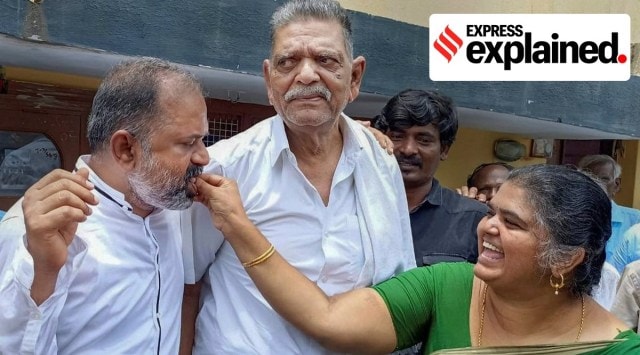 AG Perarivalan, convict in Rajiv Gandhi assassination case, with his father and sister after Supreme Court released him using special powers, at his house in Jolarpet, Tirupattur district, Wednesday. (PTI)
AG Perarivalan, convict in Rajiv Gandhi assassination case, with his father and sister after Supreme Court released him using special powers, at his house in Jolarpet, Tirupattur district, Wednesday. (PTI)In ordering the release of Rajiv Gandhi assassination case convict A G Perarivalan on Wednesday (May 18), the Supreme Court Bench of Justices L Nageswara Rao and B R Gavai invoked the extraordinary power conferred on the court under Article 142 of the Constitution.
“State cabinet had taken its decision based on relevant considerations. In exercise of Article 142, it is appropriate to release the convict,” the court said.
What is Article 142 of the Constitution?
Subsection 1 of Article 142 (“Enforcement of decrees and orders of Supreme Court and orders as to discovery, etc.”) says “the Supreme Court in the exercise of its jurisdiction may pass such decree or make such order as is necessary for doing complete justice in any cause or matter pending before it, and any decree so passed or order so made shall be enforceable throughout the territory of India in such manner as may be prescribed by or under any law made by Parliament and, until provision in that behalf is so made, in such manner as the President may by order prescribe.”
Essentially, this provision of the Constitution gives the country’s top court wide powers to do “complete justice” in a case. Article 142, which started out as draft article 118, was adopted by the Constituent Assembly on May 27, 1949.
Scope of Article 142
While the powers under Article 142 are sweeping, the Supreme Court has in its judgments over the years defined its scope and extent. Some important cases in this regard are ‘Prem Chand Garg v. Excise Commissioner, U.P., Allahabad’ (1962); ‘A.R. Antulay v. R.S. Nayak & Anr’ (1988); ‘Union Carbide Corporation v. Union of India’ (1991); and ‘Supreme Court Bar Association v. Union of India’ (1998). ‘Antulay’ was decided by a seven-judge Bench; the other three cases were decided by five-judge Benches.

* In ‘Prem Chand Garg’, the majority opinion drew red lines for the exercise of the Supreme Court’s powers under Article 142(1). It said: “An order which this Court can make in order to do complete justice between the parties, must not only be consistent with the fundamental rights guaranteed by the Constitution, but it cannot even be inconsistent with the substantive provisions of the relevant statutory laws. Therefore, we do not think it would be possible to hold that Art. 142(1) confers upon this Court powers which can contravene the provisions of Article 32 (right to constitutional remedies).”
* In ‘Antulay’, the majority opinion upheld the court’s opinion in ‘Prem Chand Garg’.
* In ‘Union Carbide’, while ordering the company to pay $470 million as compensation for the Bhopal gas disaster, the Bench underlined the wide scope of Article 142(1), saying it was “necessary to set at rest certain misconceptions in the arguments touching the scope of the powers of this Court under Article 142(1) of the Constitution”.
The court ruled: “The power under Article 142 is at an entirely different level and of a different quality. Prohibitions on limitations on provisions contained in ordinary laws cannot, ipso-facto, act as prohibitions or limitations on the constitutional powers under Article 142… It will be wholly incorrect to say that powers under Article 142 are subject to express statutory prohibitions. That would convey the idea that statutory provisions override a constitutional provision…”
* In ‘Supreme Court Bar Association’, the court ruled that its powers under Article 142 were supplementary in nature, and could not supplant substantive law and “build a new edifice where none existed earlier”.
It said: “It, however, needs to be remembered that the powers conferred on the court by Article 142 being curative in nature cannot be construed as powers which authorise the court to ignore the substantive rights of a litigant while dealing with a cause pending before it. This power cannot be used to “supplant” substantive law applicable to the case or cause under consideration of the court. Article 142, even with the width of its amplitude, cannot be used to build a new edifice where none existed earlier, by ignoring express statutory provisions dealing with a subject and thereby to achieve something indirectly which cannot be achieved directly… The construction of Article 142 must be functionally informed by the salutary purpose of the Article viz. to do complete justice between the parties. It cannot be otherwise.”
The case of Perarivalan
Perarivalan had submitted a mercy petition to the Tamil Nadu Governor in 2015 seeking release under Article 161 of the Constitution, under which the Governor is empowered to “grant pardons, reprieves, respites or remissions of punishment or to suspend, remit or commute the sentence of any person convicted of any offence”.
After failing to receive a response, he moved the Supreme Court, which in 2018 underlined the Governor’s right to decide on the remission petition. Three days later, on September 9, 2018, the Tamil Nadu Cabinet headed by then Chief Minister Edappadi K Palaniswami recommended the release of all seven convicts, including Perarivalan.
The Governor, however, continued to sit on the recommendation, and in July 2020, Madras High Court reminded him that the Constitution had not prescribed a time limit for him to act on such issues only “because of the faith and trust attached to the constitutional post”, and warned that it might be forced to intervene.
But the Governor did not react, and in January 2021, the Supreme too warned that it will be forced to release the convict on grounds of inordinate delay. In February 2021, the Governor’s office forwarded the state government’s recommendation to President Ram Nath Kovind. The file has been lying with Rashtrapati Bhavan ever since.
The Supreme Court has now ruled that inordinate delay by the Tamil Nadu Governor in exercising his powers under Article 161 can be subject to judicial review. It has rejected the Centre’s submission that the President has exclusive power to grant remission is cases pertaining to Section 302 (murder) of the IPC, and used its powers under Article 142 to release Perarivalan.
Article 142 in Ayodhya verdict
In its 2019 judgment in the Ayodhya case, the Supreme Court made detailed references to Article 142. It said while “the power under Article 142…is not limitless”, the Constitution “authorises the court to pass orders to secure complete justice…” Article 142, it said, “embodies both the notion of justice, equity and good conscience as well as a supplementary power to the court to effect complete justice”.
The court used the extraordinary powers under this provision to grant 5 acres of land in Ayodhya situated outside the disputed area to Muslim parties, saying, in an implicit reference to the demolition of the Babri Masjid in 1992, that it was invoking Article 142 “to ensure that a wrong committed must be remedied”.
“Justice”, the court said, “would not prevail if the court were to overlook the entitlement of the Muslims who have been deprived of the structure of the mosque through means which should not have been employed in a secular nation committed to the rule of law… The Constitution postulates the equality of all faiths. Tolerance and mutual co-existence nourish the secular commitment of our nation and its people.”
The court also invoked Article 142 in favour of the Nirmohi Akhara, who were party to the case. It said: “…Having regard to the historical presence of Nirmohi Akhara at the disputed site and their role, it is necessary for this Court to take recourse to its powers under Article 142 to do complete justice. Hence, we direct that in framing the scheme, an appropriate role in the management would be assigned to the Nirmohi Akhara.”
Newsletter | Click to get the day’s best explainers in your inbox
More Explained
EXPRESS OPINION
Apr 24: Latest News
- 01
- 02
- 03
- 04
- 05











